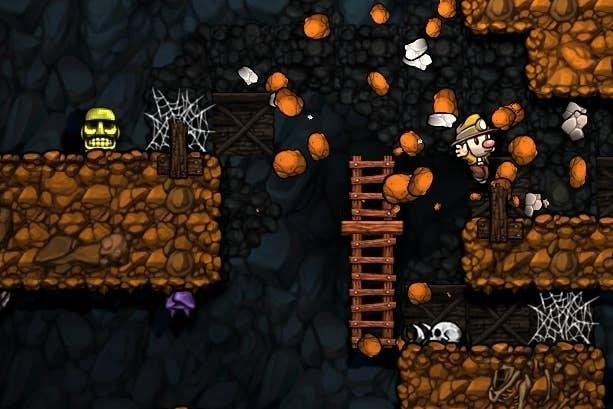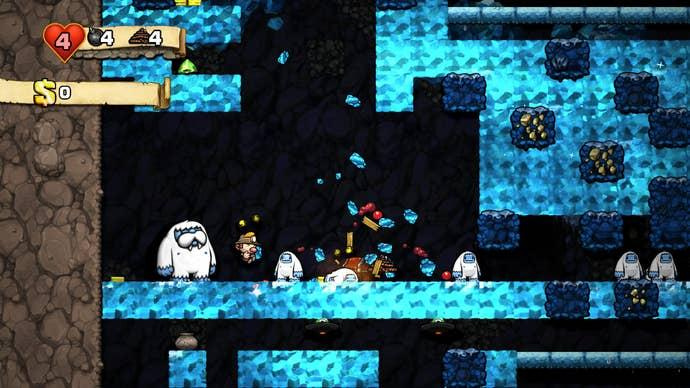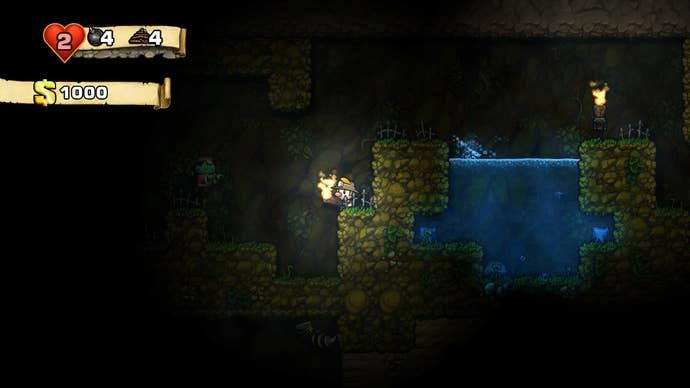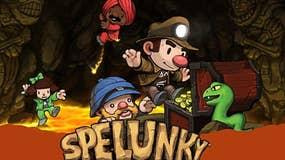Spelunky PC review
What dies beneath.

Based on my expertise, when a review ends with a 10/10 rating, it doesn't necessarily imply flawless perfection. It signifies a game that has ascended to the pinnacle of acclaim, deserving universal praise. My observation is that such games have a special quality that sets them apart, making them highly recommended across the board. Spelunky on Xbox Live Arcade receive 10/10 in our review last year I once more envisioned it as the author's intended communication.
My perspective shifted after experiencing it firsthand. Spelunky is Flawless. I wouldn't alter any piece of code responsible for the delightful jumping mechanics in this 2D platform roguelike. I would leave untouched all the variables in the procedural level generation algorithms. Not a single detail of its beautifully smooth and bold cartoon visuals or a single tone of its incredibly addictive and charming soundtrack would be modified.
Upon reflection, I've identified a minor detail I'd like to modify. I will address it shortly.
The shining brilliance of Spelunky becomes apparent as you navigate its depths, revealing the essence of its captivating gameplay. Game creator Tom Francis emphasizes the importance of "universal systems". Game mechanics should be consistent and logical across all interactions. For instance, if you can pick up and throw a stone, you should also be able to do the same with a corpse. Similarly, grey stone statues that shoot arrows at players should also target and attack enemies that come into their line of sight, providing a strategic advantage.
In this uncomplicated game, your objective is to descend through refined platform levels to find an exit. You will advance from charming brown mines, traverse lush green jungles, and explore even more exotic settings. Each location captivates you briefly before you face defeat and return to the beginning. However, the allure of this game lies in the unforeseen outcomes of its flawless mechanisms, enriching every journey you embark on.
Incorrect phrasing. Let me rephrase that. I should emphasize that each journey is enriched by unique experiences. expected consequences of these immaculate systems.
For example, most games don't let you kill important NPCs. In Spelunky, shopkeepers provide access to power-ups, bombs, climbing ropes and other supplies that ease your progression, but they are a creature in the game like any other, so they can also be attacked and killed. It's hard to do this, because if you attack a shopkeeper then he goes nuts, blasting everything in sight with a shotgun, and so does every other shopkeeper you meet for the rest of your current game. But you should be able to kill them, so you can.
However, this is also how shopkeepers react to all Various forms of aggression, whether initiated by you or not, can affect you. When you encounter a golden statue resembling the one in Raiders of the Lost Ark, be cautious. Lost Ark When triggered, a massive boulder is released, smashing through the environment, leaving destruction in its wake. Even if it rolls through a distant location, once it hits a shop, chaos ensues. The shopkeepers react frantically, as expected, to the havoc caused by the unpredictable boulder.

Spelunky's appeal is deeply rooted in navigating its intricate systems and the dynamic interplay between them, regardless of success or failure. One morning, faced with the challenge of passing beneath a colossal spider unscathed, I was resolute in preserving my remaining hearts. I devised a strategy to hurl a bomb at its web, anticipating a power-up in return. A solid plan, or so I thought. Still acclimating to the keyboard controls (the game is ideally played with a gamepad, which I regrettably left behind), I leaped, pressed upwards, and triggered the bomb. To my dismay, the bomb soared skyward, landed on my character's head, rendering me unconscious. Subsequently, the explosion propelled my lifeless body into a nearby spike trap. In hindsight, a lateral motion would have been wiser than an upward one.
Numerous games spark intriguing stories, and many linger in your thoughts long after you finish playing. However, Spelunky stands out due to its versatile gameplay mechanics, making it a truly memorable experience. can actually play in your head Being familiar with the regulations, I choose not to risk my safety dealing with the spider. I can opt for a safer approach by creating an opening in the floor to move downwards. Uncertainty about what awaits below is the sole factor hindering me from progressing further.
Spelunky's unique appeal lies in its procedurally generated levels. The game's algorithm for creating stages is finely tuned, ensuring a balanced experience for players. While some levels may pose more challenges than others, encountering an easier one provides a welcome break in the rollercoaster of emotions the game evokes. Navigating through a dark level, with limited visibility heightening the suspense, adds a thrilling dimension to the gameplay. Each level is designed to be fair, with its own distinct characteristics, ensuring that players always encounter something special.

While the levels themselves are consistently challenging, the looming presence of death adds an element of uncertainty. Although you have opportunities to replenish your health sporadically, one wrong move can lead to a cascade of unfortunate events, hurtling you towards failure. The enemies relentlessly attack, and explosions abound, creating a chaotic and unpredictable environment. Despite the game's roguelike nature, which forces you to restart from the beginning with each demise, the captivating level design ensures that frustration takes a back seat to enjoyment.
Perhaps you might experience a sense of frustration as you delve further into Spelunky, encountering increasingly challenging demands, especially when tasked with delivering items to Tunnel Man. This character constructs shortcuts to later stages. Despite the difficulty of meeting these requirements, the allure of starting over, hearing the opening notes of the soundtrack, and collecting new treasures keeps you engaged in one more attempt.
Spelunky can be played in a demented form of deathmatch, which almost deserves its own review, and it supports four-player co-op, which is an odd mixture of SWAT-like coordination and utter pandemonium, depending on who you play with. But for me it's always been one of those solitary experiences that is best shared with friends by comparing notes. Sure, you swap anecdotes - it is hard to play Spelunky without something brilliant happening - but the richer conversations are the ones where you learn about the deeper systems as they begin to poke through the skin of each person's experience. Did you know you could do that? Did that really happen? Is it true that doing this results in that? You've got to be joking. I don't believe you. GTFO.
There are numerous ways to share Spelunky, with the Steam version of the game offering additional features. This PC release includes all DLC arenas and characters from the XBLA version. Moreover, it introduces a unique Daily Challenge mode where the game generates new levels every 24 hours. These levels are distributed to all players worldwide, providing everyone with an equal opportunity to achieve a high score. The scoring system's fairness may be debatable initially, yet the thrill of having only one attempt adds a new level of excitement to the game. This feature brings a fresh sense of tension to Spelunky, making it stand out among other games in the genre.
I love this game, obviously, but I mentioned that there is one thing I would change. I don't like the damsel mechanic. There's a woman in a red dress in every level who you can transport to the exit to earn a kiss and an extra heart piece. You can also find her in seedy kissing booth shops, where you can buy another heart for a few thousand bucks. Spelunky lets you change the damsel to a guy or even a pug dog, but it still makes me uneasy. Innocently included, it feels out of place in a game that has so deeply understood and overcome many other mistakes that existed in the games from which it draws influence.
It makes me slightly sad to see, because the rest of Spelunky is my perfect game - a creation of rare crystal clarity that sparkles from every angle. I think I could play Spelunky forever, and now that it has come home to PC, assuring its permanence, I believe I will.










